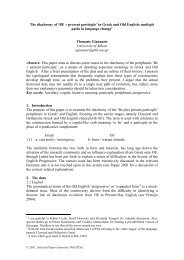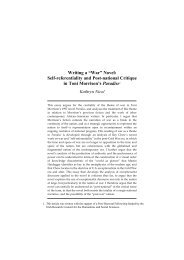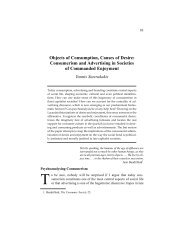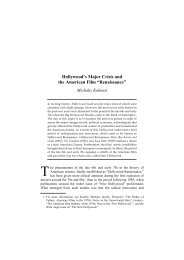19 International Symposium on Theoretical and Applied Linguistics ...
19 International Symposium on Theoretical and Applied Linguistics ...
19 International Symposium on Theoretical and Applied Linguistics ...
You also want an ePaper? Increase the reach of your titles
YUMPU automatically turns print PDFs into web optimized ePapers that Google loves.
G E N E R A L S E S S I O N<br />
s είναι µία µεταβλητή για καταστάσεις, c και o είναι µεταβλητές κορύφωσης («culminati<strong>on</strong>s») και<br />
αντικειµένου («object») και HOLD και REAL είναι κατηγορήµατα που εκφράζουν τη σχέση «ο κάτοχος<br />
του» (‘the holder of’) και «η πραγµάτωση του» (‘a realizati<strong>on</strong> of’) αντίστοιχα (πρβλ. Dölling 2000, 2001<br />
για τη γερµανική):<br />
(2’) ∃s [HOLD(anna, s) & ∀c [REAl(c,s) → ∃o [VASE(o) & BREAK(c) & PAT(o,c)]] & FOR_WEEKS(s)]<br />
Σύµφωνα µε την (2’) η (2) αναφέρεται στην κατάσταση της Άννας η οποία πραγµατώνεται από την<br />
Άννα σπάνοντας ένα βάζο.<br />
Τελειώσεις όπως: (3) η Άννα διάβαζε ένα γράµµα για ένα µήνα µπορούν να αναπαρασταθούν ως εξής<br />
(3’):<br />
(3’) ∃s [HOLDER(anna, s) & ∃ο [LETTER(o) & ∀e [REAL (e,s) → (o) & READ(e) & THEME(o,e)]] & FOR_ONE_MONTH(s)]<br />
Σύµφωνα µε την (3’) η Άννα είναι αυτή που βρίσκεται σε µια (θαµιστική) κατάσταση s τέτοια, σύµφωνα µε<br />
την οποία ένα γράµµα ο είναι θέµα κάθε γεγονότος διαβάσµατος e το οποίο πραγµατώνεται µέσα από την<br />
κατάσταση s.<br />
∆ραστηριότητες όπως: (4) η Άννα έτρεχε για πέντε χρόνια έχουν επίσης καταστασιακή ανάγνωση, όπως<br />
φαίνεται στο (4’):<br />
(4’) ∃s [HOLD (anna, s) & ∀p [REAL (p,s) → RUN(p)] & FOR_FIVE_YEARS(s)]<br />
Σύµφωνα µε την (4’) η Άννα βρίσκεται σε µία (θαµιστική) κατάσταση s που διαρκεί πέντε χρόνια, και της<br />
οποίας η πραγµάτωση γίνεται µέσα από τη διαδικασία του τρεξίµατος p.<br />
Τέλος, θα αναλυθούν προτάσεις που εµπεριέχουν καταστασιακά ρήµατα (κοιµόταν για ώρες).<br />
Challenging the interplay between trainee teachers’<br />
beliefs about <strong>and</strong> attitudes towards less<strong>on</strong> planning<br />
Areti-Maria Sougari<br />
Aristotle University of Thessal<strong>on</strong>iki<br />
asougari@enl.auth.gr<br />
Previous research has highlighted the strength of teachers’ beliefs <strong>on</strong> their teaching <strong>and</strong> professi<strong>on</strong>al<br />
development. Richards <strong>and</strong> Lockhart (<str<strong>on</strong>g>19</str<strong>on</strong>g>94) maintain that beliefs are formed gradually, c<strong>on</strong>sisting of<br />
subjective <strong>and</strong> objective norms. Social psychology <strong>and</strong> particularly the work of Ajzen (<str<strong>on</strong>g>19</str<strong>on</strong>g>91) offer<br />
insights into the inter-relati<strong>on</strong>ship of beliefs, attitudes <strong>and</strong> acti<strong>on</strong>s. By looking closely into these<br />
interc<strong>on</strong>necti<strong>on</strong>s we can underst<strong>and</strong> how trainee teachers can be helped in their quest for discovery of<br />
their teaching abilities <strong>and</strong> the unraveling of what may prove to be helpful in their teaching practice.<br />
In an attempt to detect changes in the belief systems of prospective teachers, this paper elaborates<br />
<strong>on</strong> trainee teachers’ potential beliefs about a certain course of acti<strong>on</strong> in relati<strong>on</strong> to less<strong>on</strong> planning<br />
prior to their engagement in a practicum but also presents the same teachers’ beliefs about less<strong>on</strong><br />
planning-related beliefs at the end of their teaching practice. Their attitudes towards less<strong>on</strong> planning<br />
are also retrieved so as to come to a better underst<strong>and</strong>ing of the trainee teachers’ predispositi<strong>on</strong>s<br />
towards less<strong>on</strong> planning in order to ensure more automated acti<strong>on</strong>s in their future practice.<br />
Furthermore, the less<strong>on</strong> plans developed throughout the teaching practice course are examined, while<br />
looking for c<strong>on</strong>sistencies between reported beliefs <strong>and</strong> acti<strong>on</strong>s taken.<br />
Throughout the teaching practice, an attempt is made to inculcate in trainee teachers the need to<br />
inquire <strong>and</strong> questi<strong>on</strong> their practice, to p<strong>on</strong>der up<strong>on</strong> successful instructi<strong>on</strong>-giving <strong>and</strong> appropriate<br />
selecti<strong>on</strong> of activities, <strong>and</strong> to challenge their belief systems. Thus, the insights drawn from this study<br />
illuminates what happens when trainee teachers are called to put into practice what they have been<br />
taught, how they perceive their own teaching practice <strong>and</strong> whether points highlighted in their<br />
questi<strong>on</strong>naires are indeed incorporated in their less<strong>on</strong> plans.<br />
Perspectives <strong>on</strong> internati<strong>on</strong>al students’ opportunities for academic speaking in lectures,<br />
seminars <strong>and</strong> oral presentati<strong>on</strong>s in the c<strong>on</strong>text of English-speaking universities<br />
Eleni Spapi<br />
elnsp@hotmail.com<br />
Academic speaking is an area in the field of English for Academic Purposes (EAP) that has been less<br />
investigated by the research community compared to the other academic skills - reading, writing <strong>and</strong><br />
listening (Fowerdew <strong>and</strong> Peacock, 2001). Nevertheless, in the last years <strong>and</strong> especially after the<br />
<str<strong>on</strong>g>19</str<strong>on</strong>g>80s, more <strong>and</strong> more researchers have started focusing <strong>on</strong> academic speaking <strong>and</strong> c<strong>on</strong>tributing to<br />
the development of the field. Much of the interest has been in the variety of spoken genres that can be<br />
<str<strong>on</strong>g>19</str<strong>on</strong>g> th ISTAL 52






